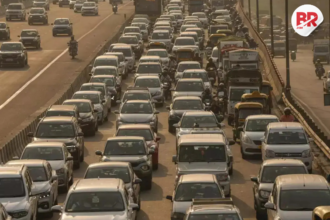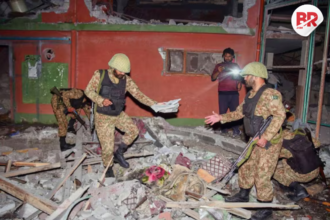
The Pahalgam terror attack in Kashmir has once again flared up the volatile relationship between India and Pakistan. The tragedy, which claimed innocent lives, has led to Pakistan’s Defence Minister, Khawaja Asif, issuing a stark warning of a potential “all-out war” with India.
This chilling statement raises one key question: Is this just more political posturing, or is there a real risk of conflict between two nuclear-armed neighbors?

The Attack: Another Catalyst for Escalation
The Pahalgam attack, a deadly reminder of the ongoing violence in Kashmir, has heightened tensions between the two countries. Pakistan’s support for cross-border militancy has long been a point of contention, and this attack has reignited those age-old accusations.
But why does this particular event feel like the tipping point? Asif’s statement, which came in an interview with Sky News, is not just inflammatory rhetoric; it’s a calculated escalation in a complex game of international diplomacy.
For the average person, this doesn’t just mean more headlines—it translates into real-life consequences. Tensions between two nuclear-armed nations make this a global issue, not just a regional one. So, what does this mean for peace?
In short: If tensions continue to rise unchecked, it could lead to catastrophic consequences for everyone involved.
Also Read Owaisi Blasts Pakistan After Pahalgam Horror: ‘They Asked Names, Then Killed’
The Irony of a ‘War’ Threat: Do They Have the Resources?
Here’s the kicker: Pakistan is warning of all-out war, but do they even have the resources to sustain such a conflict? Sure, political rhetoric is often laced with bravado, but behind the scenes, the reality is much more complicated.
With a struggling economy and internal challenges, can Pakistan really afford to escalate things further? Not to mention, war—especially with nuclear weapons in play—doesn’t just end with a clear winner. It devastates everyone, and the international community would never let that happen without intervening.
This is where the irony comes into full view. For decades, Pakistan has blamed India for the violence in Kashmir, yet here they are, threatening an all-out war without fully considering the devastating repercussions.
How sustainable is this path? How long can they keep pushing this narrative of aggression when their own economy and military are already stretched thin?
View this post on Instagram
India’s Response: Calm Amid the Storm
India’s response to Asif’s warning has been notably measured but firm. The Indian government condemned the Pahalgam attack, reaffirming their commitment to combating terrorism. However, despite the outward calm, India is not blind to the growing tension.
Behind closed doors, Indian security officials are likely assessing all possible scenarios, preparing for whatever might come next. The nation understands the gravity of the situation, but they’re not willing to give in to provocations.
The Nuclear Dimension: A Dangerous Game
The nuclear factor cannot be ignored. Both India and Pakistan are nuclear powers, and a full-scale war could have global consequences.
The concept of Mutually Assured Destruction (MAD) theoretically acts as a deterrent. Still, as history has shown, even a slight miscalculation can lead to unimaginable tragedy. The fear of nuclear escalation looms large, and the stakes are higher than ever.
Is Peace Even an Option? The Need for Accountability
While the threat of war looms, the path forward remains clear: dialogue. The two countries have been locked in hostility for decades, with annual terrorist attacks becoming almost routine. However, peace cannot be achieved without holding those responsible for the violence accountable.
Pakistan’s support for terrorist groups targeting India needs to be addressed. Is peace possible when the cycle of violence continues and those behind it face no consequences?
It’s easy to call for peace, but how can India trust a neighbor whose actions fuel terrorism? How can any nation negotiate in good faith when the constant threat of violence hangs over them, often orchestrated by groups backed by the very government calling for dialogue?
Looking Ahead: Accountability and Restraint Are Key
As Khawaja Asif’s warning reminds us, the consequences of escalation are too dire to ignore.
The situation is precarious, and while the international community watches closely, the need for accountability is paramount. Both India and Pakistan must work to de-escalate tensions, but Pakistan also must take responsibility for the terrorist groups operating within its borders.
Dialogue will never succeed if Pakistan continues to harbor those who perpetuate violence against India.
The real question is: Will Pakistan take responsibility for the actions of the terrorists it supports, or will the cycle of violence continue? If both nations fail to address this, the prospect of an all-out war will become more than just a warning.
The stakes couldn’t be higher. If peace is ever to be achieved, Pakistan must face the consequences of its actions, and only then can both nations begin to chart a path toward a meaningful resolution.
Also Read Asim Munir: Pakistan’s Osama Bin Laden? A Leader of Fear, Division, and Corruption












